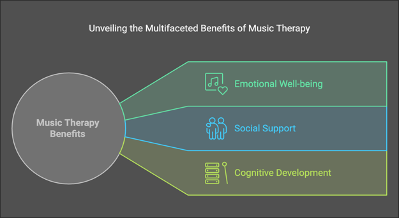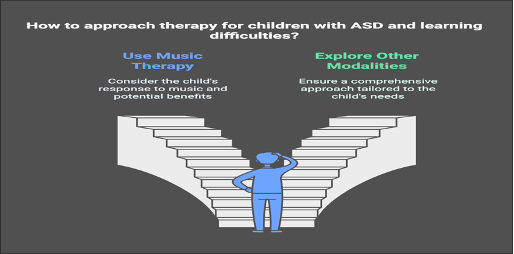by Ketut Sumerjana
Music therapy is recognized as an effective technique for improving the mental well-being of children, particularly in addressing diverse psychological and emotional challenges. Research increasingly demonstrates that music therapy is efficacious in several contexts, including psychiatric diseases, chronic illnesses, and developmental disabilities. This treatment method has demonstrated efficacy in enhancing communication abilities, elevating self-esteem, mitigating anxiety and despair, and improving general emotional well-being in pediatric populations. By employing music as a therapeutic instrument, proficient therapists can tailor therapies to meet each child's unique needs and preferences, fostering empowerment and self-expression. Active involvement with music enables youngsters to explore and process their emotions within a secure and supportive setting, resulting in notable enhancements in their mental health and overall quality of life [1-3].
Figure: 1
(Music therapy significantly enhances children's mental health by addressing psychological and emotional challenges, improving communication, self-esteem, and self-expression, thus improving their overall quality of life)
Research indicates that music therapy can significantly reduce psychological discomfort and enhance the general well-being of youngsters. [4] indicate that music therapy interventions, especially in group contexts, may surpass traditional cognitive-behavioral therapy in efficacy for adolescents with psychiatric problems. This corresponds with the findings of [5]. who observed that music therapy is advantageous for children receiving cancer treatment, aiding in the reduction of symptoms such as anxiety and depression. indicated that music therapy promoted significant improvements in physical functioning and activity involvement in children with cancer, highlighting its importance in holistic care. These studies collectively indicate that music therapy can significantly enhance the well-being and quality of life for children and adolescents confronting diverse health difficulties. Music serves as a therapeutic instrument that addresses both psychological and physical ailments, as well as overall functionality. Consequently, incorporating music therapy into treatment regimens for adolescents with psychiatric problems may provide a distinctive and beneficial method for facilitating healing and recovery [2].

Figure: 2
(Studies indicate that music therapy can markedly enhance the psychological and physical well-being of children and adolescents, exceeding the efficacy of conventional cognitive-behavioral treatment. It also facilitates cancer therapy and enhances general physical performance)
The social dimension of group music therapy sessions helps foster a sense of community and support for adolescents who may experience isolation or misunderstanding in their challenges. Evidence indicates that music therapy may serve as an effective intervention for enhancing the mental and emotional well-being of young individuals with health issues. Integrating music therapy into treatment regimens can boost emotional control, self-awareness, and coping abilities in young individuals with psychiatric problems. The innovative and non-verbal characteristics of music therapy enable adolescents to articulate themselves in manners that may be challenging through conventional talk therapy alone. Music therapy provides a comprehensive method for rehabilitation that caters to the emotional, social, and cognitive requirements of youth, resulting in improved overall outcomes in their mental health progression [6].
Figure: 3
(Group music therapy cultivates community, aids teenagers, and improves mental health, self-awareness, and coping skills, offering a holistic method for recovery)
Furthermore, music therapy has demonstrated efficacy in enhancing particular behavioral and emotional outcomes in children with developmental problems. Research demonstrates that children with Autism Spectrum Disorder (ASD) may get advantages from music therapy in improving social communication and emotional expression [7, 8]. [9] emphasize the significance of the therapeutic environment, indicating that music therapy offers a secure setting for children to articulate their emotions, essential for their emotional development. A systematic evaluation [10] further substantiates the efficacy of music therapy in enhancing communication skills in children with ASD, highlighting its potential as a regular support service [7]. Recent research has indicated the efficacy of music therapy in enhancing social interaction and alleviating anxiety in children with Autism Spectrum Disorder [8]. This comprehensive therapeutic strategy treats the fundamental symptoms of the condition while also emphasizing the development of a robust foundation for emotional health and interpersonal interactions [7].

Figure: 4
(Music therapy markedly enhances behavioral and emotional outcomes in children with developmental problems, including Autism Spectrum Disorder, by improving social communication, emotional expression, and fostering emotional well-being and interpersonal interactions)
Integrating music into treatment sessions enables children with ASD to participate in nonverbal expression, promoting a sense of connection and belonging in a nurturing atmosphere [8]. This novel therapeutic method improves social communication and emotional expression, enabling youngsters to acquire vital skills for managing the intricacies of social interactions. It is essential to recognize that certain children may not respond positively to music therapy. A kid with pronounced sensory sensitivities may see music therapy as overpowering and stressful, impeding their capacity to participate successfully in treatment [9]. In these instances, the incorporation of music may intensify the child's difficulties with social communication and emotional expression, resulting in suboptimal therapeutic outcomes. Consequently, it is imperative for therapists and caregivers to meticulously evaluate each child's unique demands and reactions to various therapeutic modalities to deliver the most advantageous treatment [11].

Figure: 5
(Music therapy enhances social communication and emotional expression in children with ASD, however it may be overwhelming for those with sensory sensitivities. Therapists must assess each child's individual requirements for optimal therapy)
The physiological impacts of music therapy are also considerable. [4] discovered that music therapies can significantly reduce anxiety and enhance mood in children with chronic illnesses. This is especially pertinent in hospital environments, where music therapy can function as a non-pharmacological intervention to reduce stress and improve the overall patient experience [12]. Furthermore, [13] found evidence in their study of postoperative pain alleviation that music therapy can have a positive impact on children's vital signs and pain management. Music therapy has demonstrated efficacy in enhancing communicative abilities and social relations among children with Autism Spectrum Disorder [7]. Music therapy, through the integration of rhythm, melody, and harmony, facilitates meaningful self-expression and social connection for individuals with ASD. Research has shown that music therapy can improve cognitive functioning and academic achievement in children with learning difficulties [14]. This indicates that music therapy may effectively tackle many developmental difficulties and promote comprehensive growth and well-being in pediatric populations [15].

Figure: 6
(Music therapy markedly alleviates anxiety, elevates mood, and promotes pain management in children with chronic diseases, Autism Spectrum Disorder, and cognitive impairments, fostering holistic development and well-being in pediatric populations)
While music therapy can be advantageous for children with ASD and learning impairments, it is essential to acknowledge that not all individuals may respond well to this intervention. Certain children may perceive music as overwhelming or distracting, resulting in possible adverse effects during therapeutic sessions [16]. It is essential for music therapists to meticulously evaluate each child's unique needs and preferences prior to integrating music therapy into their treatment plan. Furthermore, providing a range of therapeutic modalities is crucial to guarantee that each kid gets optimal care [17]. Through a tailored and comprehensive therapeutic approach, music therapists can assist children with ASD and learning difficulties in achieving their maximum potential and enhancing their overall well-being [3].
Figure: 7
(Music therapy can be advantageous for children with Autism Spectrum Disorder and learning impairments; however, not all individuals may respond well, requiring customized therapeutic approaches)
The use of music therapy in pediatric mental health care offers a viable approach to improving emotional and psychological well-being in children. The data endorses its application as a supplementary remedy that not only tackles mental health issues but also cultivates social skills and emotional expressiveness. As the discipline progresses, additional research will be crucial to enhance therapeutic methodologies and optimize the advantages of music therapy for various pediatric demographics [18]. The ability of music to connect, inspire, and heal is extraordinary, and its influence on children's emotional well-being must not be overlooked [19].
References
[1] M. Overå, "Music therapy in paediatric palliative care: A scoping review," British Journal of Music Therapy, vol. 37, no. 2, pp. 58-70, 2023, doi: 10.1177/13594575231196406.
[2] N. Belski, Z. Abdul-Rahman, E. Youn, V. Balasundaram, and D. Diep, "Review: The effectiveness of musical therapy in improving depression and anxiety symptoms among children and adolescents – a systematic review," Child and Adolescent Mental Health, vol. 27, no. 4, pp. 369-377, 2022, doi: https://doi.org/10.1111/camh.12526.
[3] I. P. Bacus, H. Mahomed, A.-M. Murphy, M. Connolly, O. Neylon, and C. O’Gorman, "Play, art, music and exercise therapy impact on children with diabetes," Irish Journal of Medical Science (1971 -), vol. 191, no. 6, pp. 2663-2668, 2022/12/01 2022, doi: 10.1007/s11845-021-02889-5.
[4] S. Kobus, A. M. Buehne, S. Kathemann, A. K. Buescher, and E. Lainka, "Effects of Music Therapy on Vital Signs in Children with Chronic Disease," International Journal of Environmental Research and Public Health, vol. 19, no. 11, p. 6544, 2022. [Online]. Available: https://www.mdpi.com/1660-4601/19/11/6544.
[5] E. Momeni Gazestan, A. Heidarei, B. Makvandi, and F. Moradimanesh, "The Effectiveness of Music Therapy on Anxiety, Self-esteem, and Social Adjustment of Children With Cancer in Kerman," Hormozgan Medical Journal, vol. 26, no. 4, pp. 180-184, 2022/10/10 2022, doi: 10.34172/hmj.2022.31.
[6] Z.-W. Lin, J.-F. Liu, W.-P. Xie, Q. Chen, and H. Cao, "The effect of music therapy on chronic pain, quality of life and quality of sleep in adolescents after transthoracic occlusion of ventricular septal defect," The Heart Surgery Forum, vol. 24, no. 2, pp. E305-E310, 03/26 2021, doi: 10.1532/hsf.3513.
[7] A. Tsirigoti and M. Georgiadi, "The Efficacy of Music Therapy Programs on the Development of Social Communication in Children with Autism Spectrum Disorder: A Systematic Review," Education Sciences, vol. 14, no. 4, p. 373, 2024. [Online]. Available: https://www.mdpi.com/2227-7102/14/4/373.
[8] J.-I. Park et al., "Effects of music therapy as an alternative treatment on depression in children and adolescents with ADHD by activating serotonin and improving stress coping ability," BMC Complementary Medicine and Therapies, vol. 23, no. 1, p. 73, 2023/03/06 2023, doi: 10.1186/s12906-022-03832-6.
[9] G. P. Klyve, R. Rolvsjord, and I. B. Elgen, "Polyphonic perspectives: a focus group study of interprofessional staff’s perceptions of music therapy at an inpatient unit for children in mental health care," International Journal of Qualitative Studies on Health and Well-being, vol. 18, no. 1, p. 2197750, 2023/12/31 2023, doi: 10.1080/17482631.2023.2197750.
[10] S. Yanagiwara, T. Yasuda, M. Koike, T. Okamoto, K. Ushida, and R. Momosaki, "Effects of music therapy on functional ability in people with cerebral palsy: a systematic review," Journal of Rural Medicine, vol. 17, no. 3, pp. 101-107, 2022, doi: 10.2185/jrm.2022-014.
[11] G. Leschallier De Lisle, A. Oudin, A. Bourla, F. Ferreri, and S. Mouchabac, "Musicotherapy mobile applications: what level of evidence and potential role in psychiatric care? A systematic review," (in English), Frontiers in Psychiatry, Systematic Review vol. 15, 2024-June-07 2024, doi: 10.3389/fpsyt.2024.1366575.
[12] M. N. Mahmud, A. Othman, and M. I. Ilias, "Increased behavioural problems associated with corticosteroid use in children with nephrotic syndrome: a Southeast Asian perspective," Singapore Medical Journal, vol. 64, no. 9, pp. 557-562, 2023, doi: 10.11622/smedj.2021128.
[13] A. Montero-Ruiz et al., "Effects of music therapy as an adjunct to chest physiotherapy in children with cystic fibrosis: A randomized controlled trial," PLOS ONE, vol. 15, no. 10, p. e0241334, 2020, doi: 10.1371/journal.pone.0241334.
[14] F. Mina, M. E. S. Darweesh, A. N. Khattab, and S. M. Serag, "Role and efficacy of music therapy in learning disability: a systematic review," The Egyptian Journal of Otolaryngology, vol. 37, no. 1, p. 31, 2021/04/14 2021, doi: 10.1186/s43163-021-00091-z.
[15] M. Lutmer1, Sribnick3 et al. 2021J Pediatr Intensive Care, "Prothrombin Complex Concentrate Utilization in Children's Hospitals," 2021.
[16] H. Zou and Y. He, "Analysis of the moderating effect of music therapy on autism in the context of big data," Applied Mathematics and Nonlinear Sciences, vol. 9, no. 1, 2024, doi: doi:10.2478/amns-2024-0153.
[17] R. B. B. R. Comm, "Effect of Music Therapy for Anxiety in Children," 2020.
[18] S. a. i. s. Sholeh1, "A Children's Music Therapy to Enhance the Self-Esteem of Children with Attention Deficit Hyperactivity Disorder (ADHD) in Elementary School," 2021.
[19] S. 2023LNEP, "Application and Effect of Music Therapy in Autistic Childrens Education," 2023.











